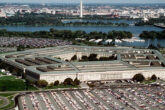October 18, 2022
Under Pressure: The Present and Future of International Order
International order is a concept much invoked and seldom defined, and even less often is it explained. Some argue that international order is anachronistic, others that it has fragmented, and still others that liberal order never really existed in the first place.
On the contrary: international order is real, it is important and, if it’s not defended, we’re going to miss it when it’s gone.
What is international order? The first page of Australia’s 2020 Defence Strategic Update warned “Confidence in the rules-based global order is being undermined by disruptions from a widening range of sources.” The introduction to the Biden administration’s new National Security Strategy states “We are in the midst of a strategic competition to shape the future of the international order.” And in their joint statement earlier this year, China and Russia noted that “The sides intend to strongly uphold the outcomes of the Second World War and the existing post-war world order.”
Defending a liberal international order requires unity and commitment. It entails costs.
World order comprises those institutions and rules that govern, if not always effectively, the conduct of nations. It is a rules-based order because it elevates standards above a might-makes-right doctrine. It is open because any nation-state that wishes to follow those standards can join its ranks; there are no exclusionary regional or ideological blocs. And it is liberal because it is weighted towards protection of free-market capitalism and liberal democratic political values.
The open, rules-based liberal order has generated significant benefits: an absence of great-power conflict, unprecedented prosperity, the expansion of democracy in every region. Given the stated intention of many governments to defend and strengthen international order, and even the protestations by countries such as China and Russia that they seek to abide by it, what, then is the problem?
One is that much of the recent political debate in the United States and in other countries has focused not on the benefits of world order but rather on its costs. Defence spending, alliances and military pacts, diplomatic deals, international economic arrangements – all are easy to dismiss as the obsolete manifestations of a Cold War mind-set, or the hubris of Western leadership, or the conceit of those who overlook the interests of the average citizens who shoulder the burdens.
Read the full article from The Lowy Institute.
More from CNAS
-
Trump Administration Realises That The Tariff Strategy Has Backfired: Lisa Curtis
Trump administration realises that the tariff strategy has backfired, says Lisa Curtis, senior fellow and program director at the Center for a New American Security.Watch the ...
By Lisa Curtis
-
DEFAERO Strategy Series [Apr 09, 25] CNAS' Becca Wasser and Phil Sheers on Revitalizing the U.S. Defense Industrial Base
On this episode of the Defense & Aerospace Report Strategy Series, sponsored by General Atomics Aeronautical Systems, Becca Wasser and Phil Sheers of the Center for a New Amer...
By Becca Wasser & Philip Sheers
-
From Production Lines to Front Lines
Executive Summary The U.S. defense industrial base (DIB) is struggling to meet the demands of the current strategic environment—let alone prepare for a potential conflict agai...
By Becca Wasser & Philip Sheers
-
The Pentagon’s Endangered Brain Trust
In this environment, sound assessments of emerging threats and new ideas to counter them will be especially vital....
By Dr. Andrew Krepinevich, Jr.




